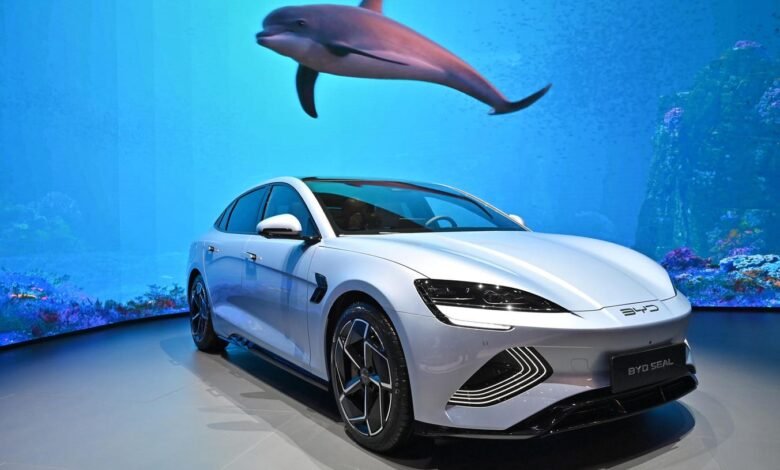EU Tariffs On EVs Won’t Derail BYD Billionaire Wang’s Expansion Plans

A BYD Seal EV is shown at the Geneva Motor Show 2024 in February.
John Keeble/Getty Images
BYD, the Chinese electric vehicle maker led by billionaire Wang Chuanfu, can manage the European Union’s additional tariffs on EVs from China, analysts say—and may grab market share from more severely affected rivals.
Shares of the dual-listed automaker surged as much as 8.8% in Hong Kong and 6% in Shenzhen on Thursday because the hike was significantly less than a previously expected 30%. The EU announced yesterday that BYD will have to pay an additional 17.4% levy on top of the existing 10% starting from next month.
The automaker, whose name stands for “Build Your Dreams,” was the least affected among Chinese EV companies targeted in an EU investigation. Citing factors such as the level of cooperation as EU officials looked into how state support and government subsidies might have helped Chinese EVs sell at low prices, the bloc decided to apply tariff hikes differently.
State-owned SAIC Motor, which owns the once iconic British brand MG, was the hardest hit, facing an extra duty of 38.1%. Billionaire Eric Li’s Geely, which owns the Swedish auto brand Volvo, will pay 20% more. The weighted average in tariff hikes for EVs shipped from China is 21%, and will be applied to models manufactured in Tesla’s Gigafactory in Shanghai. The American EV pioneer has already asked the bloc to lower its tariff rate, arguing that it doesn’t benefit as much from Chinese state support.
“The market believes that the impact on BYD won’t be as severe as previously feared,” says Kenny Ng, a Hong Kong-based securities strategist at Everbright Securities International. “Compared with other Chinese automakers, BYD may now actually have an advantage in the region.”
Ng says BYD could take market share from SAIC, as the tariff hikes might erode the MG brand’s attractiveness in Europe. Thanks to its competitive pricing, MG counted western Europe as its largest market, where it ranked fifth-largest EV brand by deliveries last year, according to market research firm Canalys. The MG4, for example, sells at a starting price of €28,990 ($31,330) versus a starting price of about €33,000 for Volkswagen’s ID.3, its main competitor. In a public statement, SAIC called on the EU to reconsider its decision, which it said will have a major negative impact on economic cooperation between China and the region.
BYD has kept the price of its electric SUV Atto 3 on par with competing models from European automakers. The vehicle is its best-selling model in the region, where BYD sold about 16,000 cars last year. It sold three million EVs worldwide in 2023, with the majority of sales in China.
Amid a brutal price war at home, the company has stated ambitious plans for Europe. It aims to capture 5% of the region’s EV market, which is the world’s second-largest with 3.2 million units delivered last year, before it starts production at a Hungary plant in 2026.
In Europe, where BYD’s profit margins are generally better than the razor
-thin 5% in China, only duties of as much as 50% might deter it from expanding, research firm Rhodium Group wrote in April. The company plans to sell more models in the region, including the Seagull hatchback starting from next year.
“EU duties on Chinese EV imports are unlikely to be high enough to slow market share gains for Chinese automakers,” Rhodium wrote, adding that as a 50% hike in tariffs remains unlikely, policymakers may turn to “non-traditional tools to shield the European auto industry, including restrictions based on environmental or national security-related factors.”
Source link




